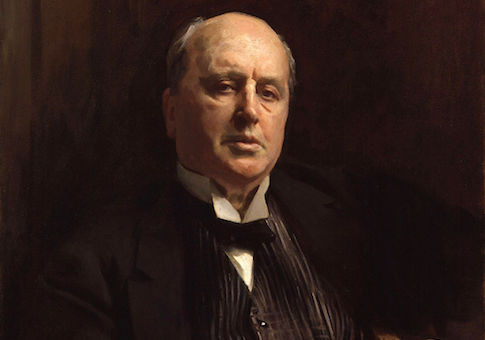As a child, Henry James displayed a precocious ability to "gape," but little else. A collection of autobiographical writings published by the Library of America, comprised of three full-scale autobiographical pieces and other revealing scribblings, indicates that the novelist possessed the sort of genius that shows itself in unconventional ways.
In the first of the self-portraits, A Small Boy And Others, James writes self-deprecatingly of his educational aptitude compared to that of his brother, the renowned 19th-century philosopher William James. Although the brothers were separated in age by only 16 months, Henry sees William almost as an adult "already seated at his task when the attempt to drag me crying and kicking to my first hour of my education failed[.]" On another occasion, when William is upstairs with a tutor performing mysterious scientific "Experiments," his brother peers in, only to be confounded by how a candle is extinguished by two fingers pinching.
But when it came to gaping, James was unrivaled. He gapes through iron rails at barn-yard animals, recalling the smell of "cold dusty paint and iron" as his "contemplative nose" presses up against a metallic fence post; at a "very big Newfoundland dog" upon whose back he rides (an event he humorously refers to as his "first vision of the liberal life"); and at a crowded town square, where James becomes cognizant of the fact that such scenes "speak more to me than anything else," even if he "scantly understood" what they said.
The youthful gape is in part explained by James’s innocence; the novelist, thankfully, did not go through life dropping his jaw and dilating his eyes at every bovine or canine that came across his path. A co-conspirator is nostalgia, an especially potent force when James sat down to dictate his autobiographies—old, frail, depressed, and having just lost William, his last companion in the world.
But while searching the contours of his memory, James catches himself several times reverting to old habits: "But I positively dawdle and gape here—I catch myself in the act," he begins one chapter. James acknowledged the presence of the gape well into adulthood, noting that, whether he found himself in New York, London, Paris, or Geneva—"wherever it might be, he was to enjoy more than anything the so far from showy practice of wondering and dawdling and gaping: he was really, I think, much to profit by it."
James never precisely reveals the source of the gape in his autobiographies. But other writings provide hints.
In a journal he kept on a visit to America (helpfully appended to the collection by editor Philip Horne), James laments his poor note-taking habits, regretting the infinite sensations from the past that he longs "to catch, to reproduce, to preserve." He vows to "keep, to a certain extent, a record of passing impressions, of all that comes, that goes, that I see, & feel, & observe. To catch and keep something of life, that’s what I mean."
Perhaps it is these "impressions" of life which overwhelmed James and caused him to gape. They are incoherent sensations of truth or beauty or something else to which the only response can be awe. The gape, then, was for James an early manifestation of the "poetic sense."
Indeed, as James argues in his landmark essay on literary criticism, "The Art of Fiction," it is the province of art and of literature to convert these impressions of awe, otherwise unintelligible and unspeakable, into coherent formulations: "[Experience] is the very atmosphere of the mind; and when the mind is imaginative—much more when it happens to be that of a man of genius—it takes to itself the faintest hints of life, it converts the very pulses of the air into revelations."
In these matters, the world of experience precedes the world of ideas, and ideas are formulated, however imperfectly, to account for experience. While rational dialect can provide the word for and attempt to define "beauty," for instance, it fails to capture the essence of what it is truly to experience beauty. The notion that an idea, no matter how penetrating, will fail to account for some of the deeper questions of life, or even mysteries to which there are no questions, is humbling.
This point constitutes the plot of one of James’s novels, The Princess Cassamassima, in which a young revolutionary bent on overthrowing society becomes cognizant of the world of beauty—which he recognizes as available only by the stabilizing force of society—and begins to doubt his ideology:
His horizon had been immensely widened, but it was filled, again, by the expanse that sent dim night-gleams and strange blurred reflections and emanations into a sky without stars. He suspended, as it were, his small sensibility in the midst of it, and it quivered there with joy and hope and ambition, as well as with the effort of renunciation.
Reading Henry James, one can’t help but gape.
